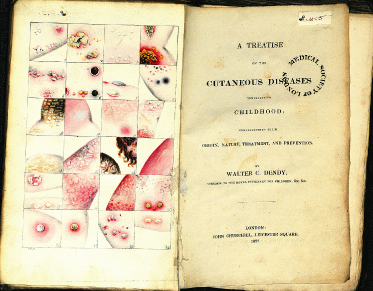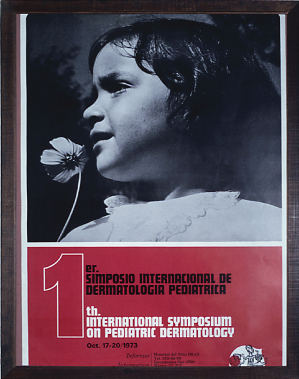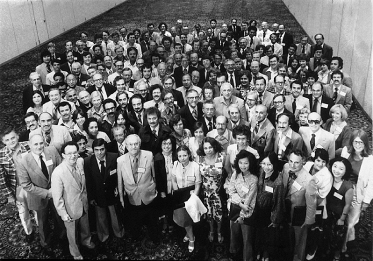The first treatise exclusively devoted to paediatric dermatology was Cutaneous Diseases Incidental to Childhood by Walter C. Dendy, published in London in 1827 (Fig. 1.2). The author was Surgeon to the Royal Universal Dispensary for Children, later to become the Royal Waterloo Hospital for Children and Women, part of St Thomas’ Hospital.
Fig. 1.2 A Treatise on the Cutaneous Diseases Incidental to Childhood. Walter C. Dendy, John Churchill, London, 1827. The first textbook of pediatric dermatology.
Courtesy of the Wellcome Library, London.

Two decades later Charles West worked at the same hospital, where only ambulatory patients attended. In 1852 Dr Charles West played a significant role in establishing the Hospital for Sick Children, Great Ormond Street, London.
In the Western world, the first generally accepted paediatric hospital is the Hôpital des Enfants Malades, opened in Paris in June 1802, on the site of a previous orphanage. From its beginning, this famous hospital accepted patients up to the age of 15 years and it continues to this day as the paediatric division of the Necker-Enfants Malades Hospital, created in 1920 by merger with the Necker Hospital, founded in 1778 for adults.
The Global Establishment of Paediatric Dermatology As A Recognized Subspecialty
It was not until 1972 that paediatric dermatology was ‘officially born’ at the first International Symposium of Paediatric Dermatology in Mexico City (Fig. 1.3). Distinguished physicians met at the famous San Angelin Restaurant and founded the International Society of Pediatric Dermatology. These pioneers included: Martin Beare (Ireland); Ferdinando Gianotti (Italy); Joan Hodgeman (USA); Coleman Jacobson (USA); Guinter Kahn (USA); Andrew Margileth (USA); Edmund Moynahan (England); Dagoberto Pierini (Argentina); Ramon Ruiz-Maldonado (Mexico); Lawrence Solomon (USA); Eva Torok (Hungary) and Kazuya Yamamoto (Japan). Prior to this children and adolescents with skin maladies were mainly looked after by paediatricians and primary care physicians, with only a few dermatologists and academics interested in the research and management of these children. Following that historic meeting in Mexico City, interest in this discipline of medicine has grown dramatically throughout the world and is now integral to all major dermatological and paediatric meetings. Since then, 10 World Congresses of Paediatric Dermatology have taken place: Chicago (Fig. 1.4), Monte Carlo, Tokyo, Milan, Toronto, Buenos Aires, Paris, Cancun, Rome and Thailand.
Fig. 1.3 Poster advertising the first International Symposium on Pediatric Dermatology held in Mexico City in 1973.

Fig. 1.4 Delegates attending the Second International Congress of Pediatric Dermatology in Chicago, including Ruggero Caputo, Nancy Esterly, Sidney Hurwitz, Alvin Jacobs, Coleman Jacobson, Gunter Kahn, Al Lane, Marc Larregue, Arthur Norins, Jim Rasmussen, Ramon Ruiz Maldonado, Jean-Hilaire Saurat, Laurence Schachner, Lawrence Solomon, Loudes Tamayo, Sam Weinberg, William Weston.
Courtesy of Dr Susan Bayliss.

There are now journals specifically dedicated to the subject published in the USA, Japan and Europe. The Society of Pediatric Dermatology in the USA was founded in 1975, the Japanese Society for Pediatric Dermatology in 1977 and the European Society for Pediatric Dermatology in 1983. The past two decades have seen a plethora of textbooks on paediatric dermatology, but it is important to highlight two authors, Sidney Hurwitz and William Weston, whose books respectively had a profound influence on the establishment of the specialty and its teaching. There are two up-to-date encyclopaedic textbooks of pediatric dermatology; one edited by Schachner and Hanson and the other edited by Harper, Oranje and Prose (first two editions) and Irvine, Hoeger and Yan (third edition).
Mexico has led the way in training with a programme for both paediatricians and dermatologists, founded in 1973 by Ramon Ruiz Maldonado and Lourdes Tamayo. More than 100 specialists now working in most Latin American countries have been trained in that programme. In the USA paediatric dermatology became an independent board-certified subspecialty as recently as 2004. Elsewhere in the world training remains ad hoc and includes paediatricians with a special interest in dermatology, dermatologists with a special interest in children, and a select handful who have a full training in both specialties. In some countries the lack of cooperation between the two disciplines can be a stumbling block to the establishment of the specialty.
Paediatric Dermatology in North America (USA and Canada)
Henry Harris Perlman was the first physician to be board certified by both the American Academy of Pediatrics and the American Academy of Dermatology (AAD), the first to limit his practice to diseases of the skin in children (1946) and the first in the USA to write a textbook dedicated solely to Pediatric Dermatology (see Moynahan, 1961, p. 954 for a review).
Stay updated, free articles. Join our Telegram channel

Full access? Get Clinical Tree








